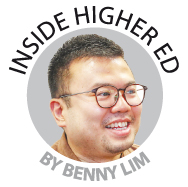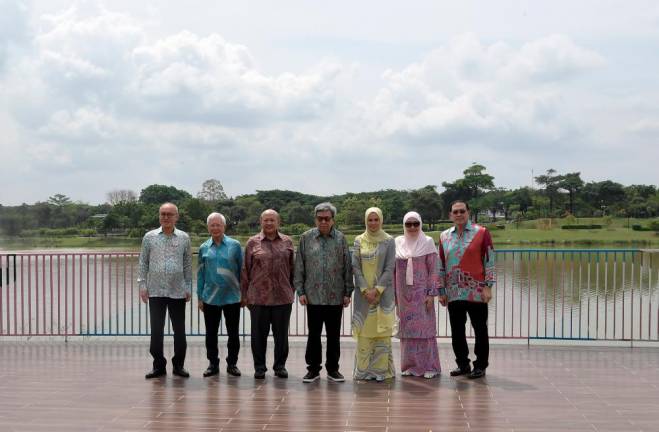INTERNSHIP has its roots in the medical field and is now an integral component of most diploma and bachelor’s programmes in universities. Through internships, students apply the theories they learn from lectures to actual work situations and reflect on their personal capabilities in their chosen field of study.
Yet, knowledge alone does not guarantee success in internships. Soft skills, such as teamwork, communication, time management, adaptability, to name a few, are equally important.
Some universities even run preparatory courses and psychometric tests to better equip their students to excel in internships. Employability upon graduation is of utmost importance, and internships provide opportunities for students to network and enhance their resumes with the much-needed initial work experience.
Companies providing internship opportunities benefit from the process too. Being digital natives with tech and social media savviness, interns often offer creative ideas, especially in engaging the youth market.
Moreover, companies could expose junior employees to management practices through managing interns. From the pool of interns, talent can be spotted, ready to be employed full time.
On March 27, the IMF chief asserted that the global economy has entered recession due to the Covid-19 pandemic. There will be a foreseeable surge in the number of business closures and unemployment rates. Around the world, countries are shutting down their borders to foreigners.
In Malaysia, the movement control order (MCO) has been extended to April 14, and all non-essential businesses have to remain closed till then.
Globally, many students are facing the situation of their internships being discontinued by their employers and universities. Of course, for certain sectors, interns could continue to work from home.
Future internship placements are also likely to be disrupted by the pandemic. Some companies might cut back on internship places, or even cancel their provision completely if they feel that the interns’ learning experience would be undermined.
Universities in Singapore are deferring students’ internships to later semesters, and in some cases, they are allowing students to replace internships completely with other credit-bearing modules.
Yet, disruption is not necessarily a bad thing, considering how our lives are constantly (re)shaped by disruptive technologies. Disruptions in internships necessitate a rethinking on how these programmes should be run in future.
In times of crisis, non-governmental organisations (NGOs) play crucial roles in helping vulnerable communities. NGOs, including the healthcare sector, would require a large number of interns from across disciplines – communications, design, and events management students to lend their support in awareness campaigns; culinary students to contribute their skills in food banks; IT students to enhance support services online.
Around the world, governments have announced stimulus packages to boost the economy and support businesses and individuals. In Malaysia, the government has pledged over RM100 billion to be channelled to businesses to reduce retrenchment and spur economic activity.
For many industries, such as the hospitality and tourism sector, the road to economic recovery will be an arduous one. Nonetheless, this stresses the importance for companies to relook strategic planning across different functional units. Interns could support in the planning process, especially in putting forward fresh perspectives.
Companies could also develop special projects for interns, specific to recovering from the pandemic, bearing in mind that the failure of these projects would have little or no impact on the companies.
Yet, if the interns could develop something substantial, the companies would stand to benefit. From the students’ standpoint, this is an excellent experience for reflexive practice, regardless of whether their projects get adopted or not.
Instead of waiting for internship placements, students could also initiate and run their own projects through identifying gaps in the marketplace.
In my last column (Develop resilience thinking in students, March 25), I argued that resilience thinking is about “identifying opportunities in times of change through forming new perspectives from building global connections and networks”.
In Malaysia, for instance, opportunities could include developing digital literacy among elderly people, so that they could perform essential tasks online, such as internet banking and the purchase of groceries. Upon the lifting of the MCO, the demand for domestic tourism could grow exponentially, especially during the mid-year school holidays. Tourism students could design unique packages promoting domestic cultural and/or nature tourism and offer them to tour companies.
Internships often run for a consecutive period, and students are mostly away from their universities for the entire time. Should there be a significant reduction in the number of internship placements in the coming months or even beyond a year, universities could alter their programme to what I call, pockets of practicums.
A practicum is usually short and on a part-time basis, where the focus is on learning by observing, rather than by doing. By attending different practicums over a longer period of time outside their school hours, students accumulate learning points from these practicums, while still being able to attend classes.
Moving forward, internships/ practicums should also be aligned to students’ final undergraduate research. Internship exposes students to current practices of the industry – the present. However, practices evolve over time, and hence, research plays a pivotal role in identifying future trends and practices.
After all, students are the future of our society, and I believe internships should offer students insights of the future.
Associate Professor Dr Benny Lim is the Dean of Faculty of Liberal Arts, and the Acting Dean of Faculty of Hospitality and Tourism, Berjaya University College. Comments: letters@thesundaily.com













